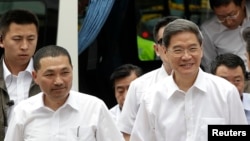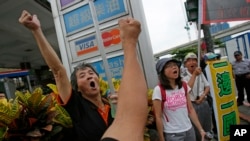China's top official in charge of relations with self-ruled Taiwan said on Friday that he understood and respected the choices of its people, as he was met by noisy protests in the traditionally anti-China far south of the island.
Zhang Zhijun, director of China's Taiwan Affairs Office, is making the first trip by the head of the body to Taiwan, a visit marked by a highly unusual meeting with an opposition party stalwart and mayor of the pro-independence southern port of Kaohsiung, Chen Chu.
Protesters waved placards deriding Zhang as a “communist bandit”.
Zhang's unusual charm offensive in Taiwan stands in contrast to China's ties with several countries in Asia where territorial rows have flared over maritime boundaries. China has also denounced people in the former British colony of Hong Kong, which returned to China in 1997, for pushing for greater democracy.
While Chen has previously visited China and met Zhang there, spearheading efforts by the Democratic Progressive Party to engage with Beijing, high-level meetings in Taiwan with opposition figures are almost unheard of.
“We know that Taiwan people cherish very much the social system and the life style they have chosen,” Zhang said after meeting Chen. “We in mainland China respect what Taiwanese people have chosen.”
China welcomes people from all parties to help improve relations across the Taiwan Strait, Zhang added, calling his talks with Chen “pleasant”.
China claims Taiwan as its own, to be taken by force if necessary, though the two have been ruled separately since defeated Nationalist forces fled to the island in 1949 at the end of the Chinese civil war with the Communists.
China says it will not countenance a de jure independent Taiwan.
Many Taiwanese look with nervousness, if not fear, at China, where the ruling Communist Party remains unmoved by calls for political liberalization. Taiwan is a freewheeling democracy after undergoing a democratic transition in the 1980s.
Taiwan's pride in its democracy helps reinforce the unwillingness of many to be absorbed politically by China.
That sentiment is felt particularly keenly in Kaohsiung, one of the main heartlands of Taiwanese cultural identity and where, in 1979, rights activists held a pivotal rally which helped spark Taiwan's eventual democratic transition.
“It's been a very difficult journey that Taiwan has gone through in the past few decades,” Zhang said.
Democracy in action
Chen, who was deeply involved in Taiwan's struggle for democracy, said she explained to Zhang that the protests he may have witnessed were part of Taiwan's political system.
“I told director Zhang that as soon as he arrived at the airport, he may have heard very different voices and protest. I said this is a very normal part of Taiwan's democracy. I appreciate if he can understand that,” Chen said.
In 2009, China reacted angrily at plans to show a documentary about exiled Uighur leader Rebiya Kadeer, a woman China labels a dangerous separatist, at the Kaohsiung film festival, sparking a boycott of the city by Chinese tourists.
Chen at the time shrugged off China's complaints, saying it would harm Kaohsiung's commitment to human rights if it gave in to Beijing.
Underscoring the depth of feeling in southern Taiwan, Zhang was met by hundreds of protesters at Kaohsiung's high speed train station, some waving placards reading “Communist Zhang Zhijun, get the hell back to China”.
A much smaller group of protesters also met him when he flew into Taipei on Wednesday.
“Chen Chu should face the demands of the people and the values of human rights and refrain from the pursuit of economic growth at the expense of Taiwan's hard-earned democratic achievements,” said Chen Yin-ting, part of another group of protesters outside the venue where Zhang and Chen met.
The once heavily industrialized Kaohsiung has lost many of its companies and factories to China, drawn away by a massive population and low manufacturing costs, and it has struggled economically in recent years.
Zhang's trip comes at a sensitive time.
Protesters occupied Taiwan's parliament and mounted mass demonstrations over three weeks starting in March in anger at a pending trade pact, which will open various sectors in both economies.
The opposition calls the pact a threat to Taiwan's industry and fears it could open the door to Chinese influence on its politics.
Signed a year ago, it has stalled in Taiwan's parliament, which is set to discuss it at a session overlapping with Zhang's visit. Advocates, including the China-friendly President Ma Ying-jeou, say it is a step to normalizing ties and will provide jobs and raise living standards.








